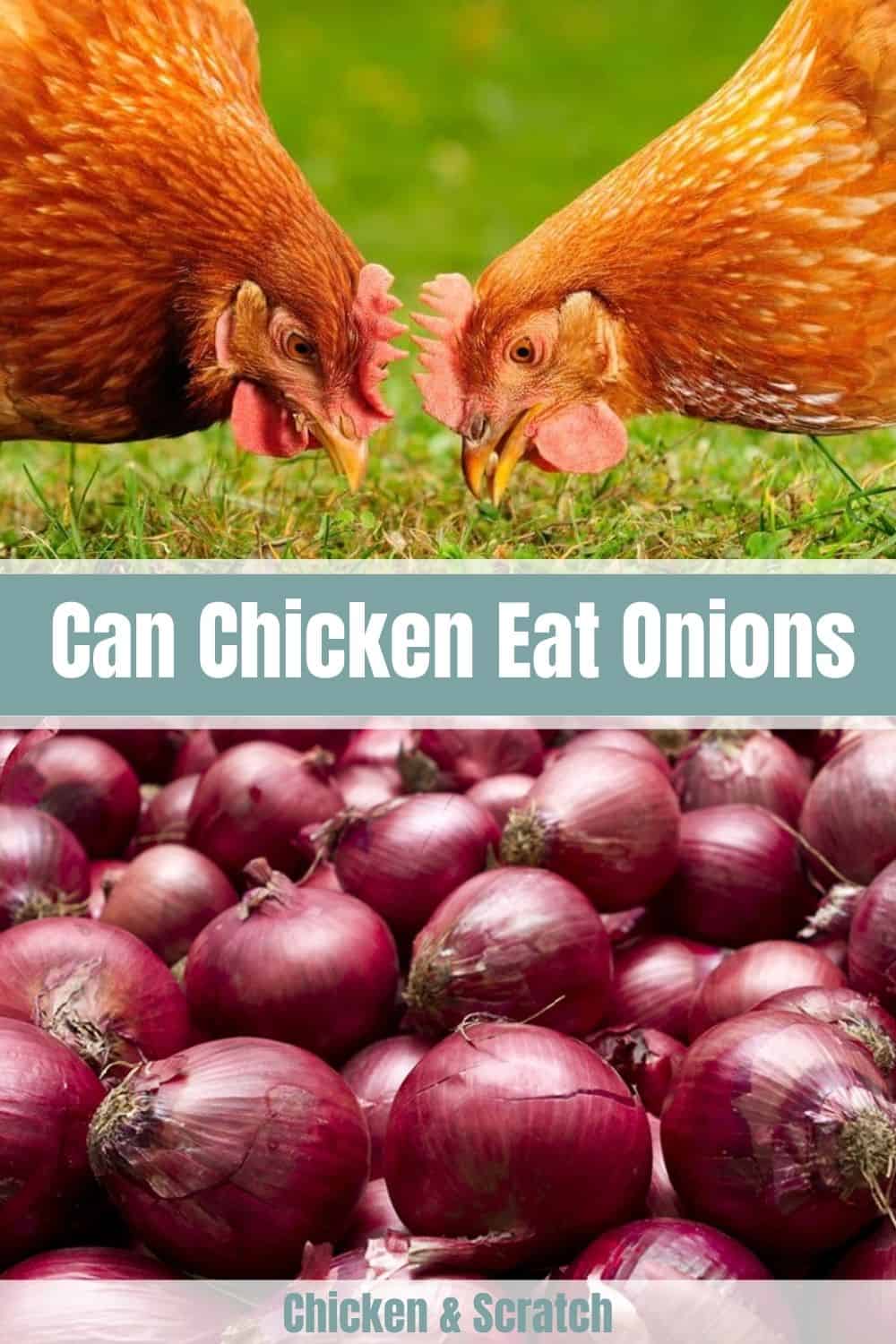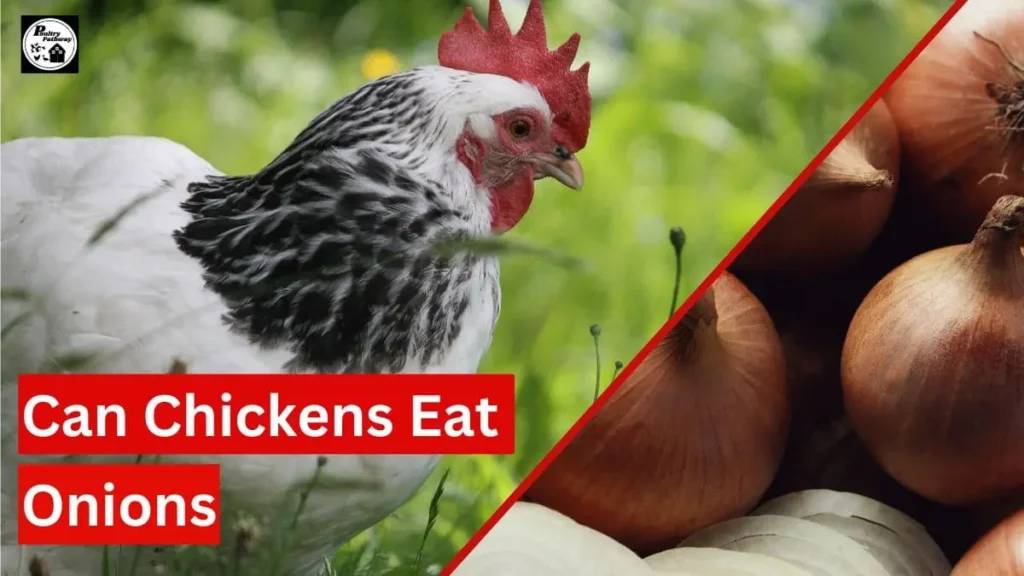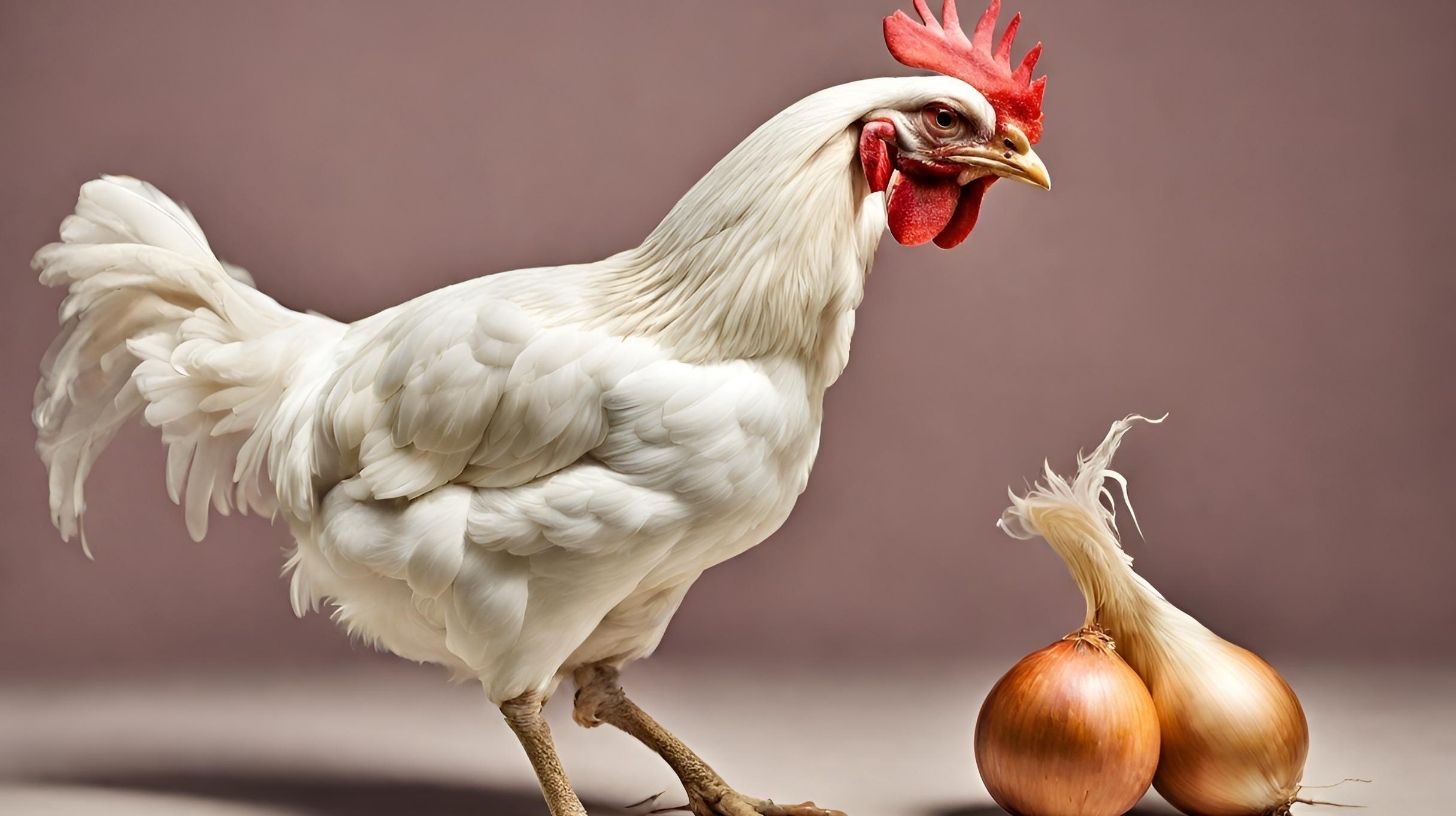Can Chickens Eat Onions? Yes, But Read This First!
Ever wondered if your feathered friends can enjoy the pungent flavor of onions? The answer is a resounding yes, chickens can eat onions, but with a significant caveat: moderation is key. Onions, those humble bulbs found in nearly every kitchen, present a complex nutritional profile for chickens, offering potential benefits alongside potential risks.
For generations, chicken keepers have debated the merits and dangers of incorporating onions into their flock's diet. The prevailing wisdom hinges on a delicate balance. While onions boast an array of vitamins, minerals, and antioxidants that can bolster a chicken's immune system and overall health, they also contain compounds, notably thiosulphate, that can wreak havoc on their red blood cells if consumed in excess. This article delves into the nuanced world of feeding onions to chickens, exploring the types of onions suitable for consumption, safe preparation methods, potential health impacts, and practical guidelines for responsible feeding.
| Aspect | Details |
|---|---|
| Food Item | Onions (All varieties: white, yellow, red, green/spring) |
| Nutritional Benefits |
|
| Potential Risks |
|
| Safe Dosage |
|
| Preparation Methods |
|
| Edible Parts | Bulb, green tops (in moderation) |
| Toxic Compounds | Thiosulphate, sulfur compounds (in high concentrations) |
| Symptoms of Toxicity |
|
| Alternative Uses | Pest repellent (onion skins in nesting boxes) |
| Reference Website | University of Minnesota Extension - Raising Chickens |
The primary concern surrounding feeding chickens onions stems from the presence of thiosulphate, a compound that can induce Heinz body anemia. This condition occurs when thiosulphate damages red blood cells, hindering their ability to carry oxygen effectively. In severe cases, anemia can lead to weakness, lethargy, and even death. The risk is particularly pronounced with excessive consumption of raw onions, which contain higher concentrations of these sulfur compounds. However, the key lies in the quantity. Small amounts of onion, carefully integrated into a balanced diet, are unlikely to cause harm.
But what exactly constitutes a "small amount?" Most poultry experts recommend that onions should comprise no more than 1% of a chicken's total daily food intake. This translates to a very small portion, especially when considering the average size of an onion. For instance, a mature hen weighing around 5 pounds should consume no more than a few grams of onion per day. Its crucial to consider not only the amount of onions fed, but also the overall balance of their diet, ensuring they receive adequate protein, carbohydrates, and other essential nutrients from high-quality feed.
The type of onion also matters. White, yellow, red, and even green onions (scallions) can be offered to chickens in moderation. Green onions, while milder in flavor and thiosulphate content, should still be given sparingly. Some chicken keepers believe that cooking onions reduces their toxicity, although scientific evidence to support this claim is limited. Nevertheless, cooking can soften the onion, making it easier for chickens to digest, and may also slightly reduce the concentration of sulfur compounds. Whether raw or cooked, the onion should always be finely chopped to prevent choking hazards and ensure even distribution within the feed.
Beyond the risks, onions offer a range of potential health benefits for chickens. They are a source of prebiotics, which promote the growth of beneficial bacteria in the gut, contributing to improved digestion and a stronger immune system. Onions also contain antioxidants, such as quercetin, which can help protect cells from damage caused by free radicals. Additionally, they provide vitamins C and B6, as well as the mineral manganese, all of which play vital roles in maintaining a chicken's overall health and vitality.
Some chicken keepers have observed that onions, along with other members of the allium family like garlic, possess natural pest-repellent properties. Placing whole garlic cloves or onion skins in nesting boxes or scattering them around the coop can help deter mites, lice, and other unwanted insects. Chickens are less likely to consume the onions when presented in this form, minimizing the risk of thiosulphate toxicity while still providing a natural form of pest control. Its a win-win situation: a healthier flock and a pest-free environment.
However, it's important to be vigilant for signs of onion toxicity in your chickens. Common symptoms include weakness, depression, diarrhea, labored breathing, and a loss of appetite. If you notice any of these signs, immediately discontinue feeding onions and consult with a veterinarian specializing in poultry. Early intervention is crucial to prevent the condition from worsening and potentially becoming fatal. In addition to closely monitoring your chickens for any adverse reactions, observe any changes in the color or consistency of their manure. Unusual droppings could be an indicator of digestive upset or other underlying health issues related to onion consumption.
Many chicken keepers also wonder about the impact of onions on egg production and quality. While onions themselves are unlikely to directly increase egg production, their nutritional content can contribute to overall hen health, which indirectly supports healthy egg laying. However, there's a possibility that excessive onion consumption can impart a distinct oniony flavor to the eggs. This is more likely to occur if chickens are fed large quantities of onions on a regular basis. To avoid this, maintain a moderate approach and carefully monitor the taste of your eggs.
If you're hesitant to feed onions directly to your chickens, there are alternative ways to incorporate their beneficial properties into their diet. Onion powder, for instance, can be added to their feed in small amounts. Studies have shown that even a 1% concentration of onion powder can provide probiotic health benefits and boost the immune system. However, it's crucial to use pure onion powder, free from additives or preservatives that could be harmful to chickens. Another alternative is to offer other vegetables rich in similar nutrients, such as carrots, spinach, or sweet potatoes. These vegetables provide a wider range of vitamins and minerals without the potential risks associated with onion consumption.
Introducing onions into your chickens' diet should be a gradual process. Start with very small amounts and carefully observe your flock for any adverse reactions. If they show no signs of illness or digestive upset, you can gradually increase the amount of onion, always staying within the recommended guidelines. Remember, every flock is different, and some chickens may be more sensitive to onions than others. Pay close attention to your individual birds and adjust your feeding strategy accordingly. Over time, you'll develop a better understanding of your flock's tolerance and preferences.
Ultimately, the decision of whether or not to feed onions to your chickens rests with you, the keeper. By understanding the potential benefits and risks, and by following the guidelines outlined in this article, you can make an informed choice that prioritizes the health and well-being of your flock. Remember, moderation, careful preparation, and close observation are the keys to safely incorporating onions into your chickens' diet. A little bit of onion can go a long way in supporting their health and vitality, but too much can lead to serious health problems. So, proceed with caution, and always prioritize the well-being of your feathered companions.
While this article focuses on onions, it's also crucial to be aware of other foods that are potentially harmful to chickens. Raw potatoes, particularly their green parts, contain solanine, a toxic compound that can cause digestive problems or even death. Similarly, certain types of mushrooms, avocado pits and skins, and chocolate are all poisonous to chickens and should be strictly avoided. Always research any new food before offering it to your flock to ensure their safety.
The world of chicken keeping is filled with debates and differing opinions, but one thing remains constant: the desire to provide the best possible care for our feathered friends. By staying informed, practicing moderation, and paying close attention to your flock's individual needs, you can ensure that they thrive and continue to bring joy to your life. So, go forth, experiment cautiously, and enjoy the rewarding experience of raising healthy and happy chickens.
Chickens are omnivorous creatures and will eat most things offered to them, but understanding what is safe and beneficial is essential. Just like chickens can enjoy mangoes and tomatoes, knowing which parts of plants are safe and which are toxic is paramount. With onions, the bulb and green tops are generally safe in moderation, but the key is to prevent overconsumption to mitigate the risk of health issues. By keeping these factors in mind, you can provide a balanced and safe diet for your chickens, ensuring their health and vitality.
Even in over two decades of raising chickens, many seasoned keepers find that their flocks often avoid onions and other alliums (garlic, chives, leeks), even when these items are a small part of the overall food composition. This natural aversion can sometimes act as a self-regulating mechanism, preventing chickens from consuming harmful quantities. However, it's crucial not to rely solely on this, as some chickens may still eat onions, especially if other food sources are limited. Diligence and careful observation remain the best tools for ensuring your flock's safety and well-being.
Article Recommendations
- Search Tips We Did Not Find Results Check Spelling Try Again
- Chennedy Carter Family Wnba Free Agency More 2024 Update



Detail Author:
- Name : Jaclyn Hamill
- Username : lucienne37
- Email : powlowski.allison@lehner.com
- Birthdate : 1988-08-16
- Address : 5253 Robel Pines Sanfordborough, KY 67170-2118
- Phone : +14457174732
- Company : Legros, Weissnat and Koepp
- Job : Human Resource Manager
- Bio : Mollitia voluptatem alias quia voluptatibus. Et aperiam eaque tempora fugiat optio est. Dolorum voluptates dolorum dicta est quibusdam illum rerum. Sit pariatur velit eos in vel.
Socials
twitter:
- url : https://twitter.com/block1977
- username : block1977
- bio : Non quo assumenda eos corporis non suscipit quisquam hic. Est ea porro et qui non quas nesciunt occaecati. Qui totam ullam voluptatem et est sint in.
- followers : 6888
- following : 996
instagram:
- url : https://instagram.com/block1978
- username : block1978
- bio : Amet perferendis eveniet quibusdam blanditiis est. Quaerat voluptatum facilis maiores eos.
- followers : 6633
- following : 559
tiktok:
- url : https://tiktok.com/@block1994
- username : block1994
- bio : Voluptatem magnam dignissimos illum necessitatibus qui cum et quisquam.
- followers : 6037
- following : 1310